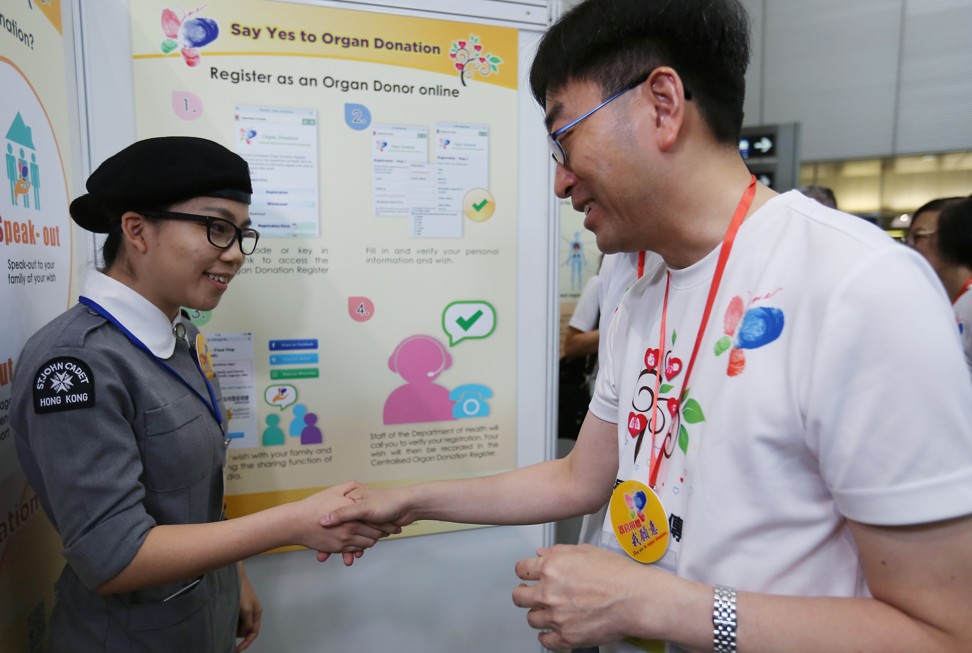How Hong Kong’s hospitals can boost organ donation rates
Bernard Chan says the opt-in/opt-out debate aside, a cost-effective plan for Hong Kong would be to have trained professionals in hospitals liaise with families to boost donor numbers

The issue of organ donations has recently been in the news again in Hong Kong. The sad case of 43-year-old Tang Kwai-sze highlighted the issue in April. Her daughter was willing to donate part of her liver, but the law did not allow her to do so as she was just short of her 18th birthday. A selfless and courageous stranger, 26-year-old clerk Momo Cheng Hoi-yan, volunteered to donate. Cheng was rightly hailed a hero and an inspiration to Hong Kong. Following her example, thousands of new potential donors registered with the Department of Health.
Perhaps Cheng’s heroism will have an even greater impact by helping to change public perceptions about organ donations – and ultimately the law. One legal issue raised by the case is about the minimum age of 18 for organ donors. Tang’s daughter even considered applying for a judicial review to get the existing law overturned. Several lawmakers and commentators now propose reducing the minimum age.
Hong Kong is broadly in line with international standards by setting the minimum age at 18. The aim is obviously to ensure donors are mature enough to make such a decision. However, some jurisdictions allow living donors to be younger; California, for example, allows donation at 15 with parental consent. Hong Kong could certainly consider lowering this age. However, this debate is something of a sideshow.
The real issue for Hong Kong is the very low donation rate among eligible adults, especially from the deceased. Over the years, several hundred thousand people – I am one – have picked up and signed organ donation cards to carry. And just over 250,000 people are recorded on the Centralised Organ Donation Register. However, family members must still give their consent for organs to be donated.
Because many are reluctant to do so, we have a rate of only around five or six organ donations per million people. In most developed economies, the number of deceased donors per million is far more: it is 13 in the UK, over 20 in the US and close to 40 in Spain. The result for Hong Kong is very long waiting lists for the most commonly donated organs: kidneys and livers.

One explanation is the traditional Chinese belief that the body should remain intact after death. However, there is not much evidence that this is a common and strong belief today, especially among the younger generation. Another explanation is that people are ignorant or even suspicious about organ donation. The Hong Kong Medical Association website’s page on the subject assures readers that doctors will not switch off life support if they know a patient has signed an organ donation form.
There has been a lot of debate about whether we should move from an “opt-in” to an “opt-out” system for organ donors.
In other words, we should not rely on people to decide whether they want to donate, by carrying an organ donation card, for instance. We should assume they are willing, unless they actively declare otherwise – maybe by carrying a “non-donation” card.
Officials have avoided pushing this idea, as they fear public opposition. Maybe the best solution is to enhance the organ donation process at the hospital level. Spanish experts visiting Hong Kong last year recommended a combination of measures to create a more proactive system. It would involve training frontline medical staff to identify possible donors in good time. And it would require upgrades in specific organ-donation skills for certain hospital doctors.
Perhaps most of all, it would require enhanced liaison between hospitals and relatives of likely donors.
Hong Kong’s entire hospital system currently shares a relatively small number of organ donation coordinators. Ideally, hospitals would have a larger pool of trained professionals able to approach relatives personally, deliver bad news and discuss possible authorisation for organ donation. Although this requires more resources, it may be more cost-effective than trying to increase the number of people carrying donor cards or signing up to the donor registry.
Bernard Chan is a member of the Executive Council